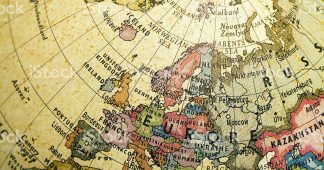By Marwan Emil Toubasi
The European Parliament elections for 2024 ended last week , which took place five years after the last elections to fill 720 seats, in an atmosphere charged with economic, political and social challenges facing the 27 European Union countries. Results showed progress and electoral rise for far-right and populist parties, reflecting major changes in the European political scene. This change could significantly affect the European Union’s policies towards many global issues, including the Palestinian issue and the stability and unity of the European Union itself.
The populist far right made gains in these elections in many parts of the European Union, so that they obtained a total of 32% of the total seats, exploiting voters’ concerns about immigration, inflation, poverty, the cost of environmental reforms, and the repercussions of energy problems as a result of the war.
But it is unclear whether they will be able to truly influence future EU policy on these issues.
The emergence of leaders from the populist right today in Europe, such as Marine Le Pen in France and Viktor Orban in Hungary, Austria, Belgium, and Italy, are similar to Trump in their right-wing populist rhetoric, which Trump previously exploited, which sparked support from American voters. Therefore, the success of far-right parties in Europe could encourage similar movements in the United States by showing that there is great support and consensus for these ideas. This may motivate Trump and his supporters to intensify their extremist populist rhetoric in the ongoing election campaign there in the USA. Although the political systems in Europe and the United States differ greatly, it may constitute one of the various factors that may help Trump reach the White House. This, in my opinion, will then form the corners of the global right-wing populist triangle between Washington (Trump or even Biden if he stayed ), Brussels and Tel Aviv, especially with Netanyahu able to continue or with the presence of other right wing Zionists , which will push the world into more wars and crimes against peoples and human values.
However, on the other hand, the results of left-wing parties in the European Parliament elections this session showed varying performance across the countries of the continent. Parties declined in some countries and others advanced. However, the left in general, compared to the previous elections, did not achieve tangible progress despite the levels of support that these parties had previously enjoyed, and even during the electoral campaign phase in which Palestine was the first presence in its campaigns and programmes, which may have been at the expense of the social issues of the Europeans themselves, which did not contributes for more votes unfortunately.
The majority of seats under the dome of the European Union Parliament, in which Union laws and legislation are discussed and amended, approved or rejected, remain largely in the hands of the center parties of the conservative right and the traditional left.
To influence European Union policy, far-right or populist parties from all parts of the Union will have to unite in a single bloc under Parliament in order to give themselves influence after the progress their parties have achieved in many of the countries participating in the elections.
The rise of extreme right-wing parties
In France, the National Rally party led by Marine Le Pen achieved significant gains, reflecting changes in the French political mood towards the extreme right. In Germany, the Alternative for Germany party saw an increase in the number of seats, and in Belgium, the Vlaams Belang party also advanced significantly in Austria, Hungary and Italy. Therefore, it is expected that the right-wing populist “Identity and Democracy” bloc will become the third largest group in the European Parliament with about a hundred seats, which will enhance the influence of the populist far-right in European decision-making and recommending general policies that are implemented by the European Commission in accordance with the Union system. It also enhances the influence of the right in future European foreign policies.
Left parties
The results of left-wing parties in the 2024 European Parliament elections showed mixed performance across the continent. Left parties generally declined compared to previous elections, as they did not achieve the same levels of support they had previously enjoyed.
These parties in Europe witnessed a general decline in these elections. The European Left Party bloc and the Social Democratic Party bloc were unable to achieve significant gains, despite some successes in countries such as Germany, France, Ireland, Greece and Spain. This decline makes it necessary for left-wing parties to form broad alliances with the bloc of center parties from the conservative right to achieve any trends in European domestic and foreign policies. However, the Communist Bloc maintained its number of seats amid these changes.
Conservative right parties
As for the traditional conservative right-wing parties, the right-wing European People’s Party bloc in Parliament has maintained its position as the largest parliamentary group, despite its parties in various countries losing some seats and declining in strength.
Despite these declines, an alliance that includes right-wing and left-wing socialist parties can maintain a majority in Parliament, strengthening the role of traditional left- and right-wing forces in decision-making.
The repercussions of the results on the unity and future of the European Union
The increasing strength of far-right and populist parties could lead to fundamental changes in EU policies, especially in areas such as migration, security, economic policy and the environment as well on the future of the Union. These parties often adopt extreme nationalist positions, or what they call European Christianity, and anti-immigration, islam phobia which may increase tensions within the Union countries and lead to greater difficulty in achieving consensus on common policies.
As for the future and unity of the European Union, this shift towards the extreme right may lead to strengthening positions against the continuation of the European Union and increasing political conflicts within the European Parliament.
Impacts on the Palestinian issue
As for the Palestinian issue, the influence of extreme right-wing parties on the European Union’s policies towards Palestine may be tangible, as it is known that most of these parties adopt positions supportive of Israel and occupation policies. This may lead to a decline in the traditional support of the European Union countries for the two-state solution, even if it is verbal, or for policies that support the rights of the Palestinians in international forums, and a decline in providing financial aid to the Palestinian National Authority to the treasury or through development programs, as well as exerting pressure and imposing conditions on Palestinian institutions, and passing on interestsIsrael in Parliament and European Union institutions.
The main issues before the European voter
The main issues that affected European voters’ attitudes in the elections included: the economic crisis of poverty and unemployment, the repercussions of European support for Ukraine at the expense of European peoples, climate and environmental changes, health and energy security, and immigration. This was accompanied by concerns about defense and security that were largely present in the programs, especially in light of the proxy war waged by the United States against Russia in Ukraine.
Victory of Palestinian candidates
Among the striking results in these elections was the nomination and victory of two female candidates of Palestinian origins, the first a French woman of Palestinian origin and the second a Spanish woman of Palestinian origins, also for two seats in the European Parliament on the lists of left-wing parties. This event reflects the growing diversity in racial and ethnic representation within the European Union Parliament, and can have a positive impact in enhancing awareness of Palestinian issues and exposing the crimes of the occupation within the European Parliament.
Influencing the future policies of a number of countries
As for France, these results led to Macron calling on to hold early national elections, as well as to the resignation of the Belgian Prime Minister due to the political pressure accompanying these results. Certainly, these results will also have clear impacts on public policies in Germany after the extreme right has achieved a rise there. Electorally, as in Austria and others. This may lead to major political changes in the two countries in particular and in a number of others and perhaps in the European Union in general, as the influence of right-wing parties that adopt nationalist and extremist policies towards the European Union is increasing, which indicates that we are facing a new historical and political phase that the European continent will witness since the end of World War II and the plan Marshall .This may also depend on the results of the US presidential elections.
We remind our readers that publication of articles on our site does not mean that we agree with what is written. Our policy is to publish anything which we consider of interest, so as to assist our readers in forming their opinions. Sometimes we even publish articles with which we totally disagree, since we believe it is important for our readers to be informed on as wide a spectrum of views as possible.











